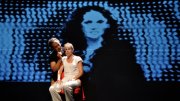It’s a busy Commencement week for actress and producer Amy Brenneman ’86. In addition to returning to Cambridge for her twenty-fifth reunion (and joining four classmates for a panel on “How has life changed in 25 years?”), she is starring in a play at the American Repertory Theater (ART). The one-act autobiographical theater piece, Mouth Wide Open, explores moments in Brenneman’s spiritual evolution (she concentrated in comparative religion at Harvard) as well as her life as a prominent Hollywood film and television actress (NYPD Blue, Frasier, Judging Amy, Grey’s Anatomy, Private Practice) and a patient battling the severe autoimmune disease ulcerative colitis. The play, part of the ART’s new “First Look” initiative, will have seven performances from May 24 through May 29.
Brenneman wrote the script and created the play in collaboration with New York-based director Sabrina Peck ’84, who directed Mouth Wide Open and with whom Brenneman has worked with since their college days. (Both women are also associate artists with the Los Angeles-based Cornerstone Theater Company.) “Our creative conversation is always ongoing,” Peck says. (Another continuing creative relationship is the one Brenneman has with her mother, the Honorable Frederica Schoenfield ’47, LL.B. ’53, a juvenile-court judge in Connecticut and the model for her daughter’s character on Judging Amy.)
Mouth Wide Open was first staged last summer in a workshop production at The Yard, a performance space on Martha’s Vineyard near Brenneman’s home there. “It was perfect,” she says. “Soulful, immediate, in a sweaty barn.” Senior research fellow Robert Brustein, the founding director of the ART, saw the Yard production and brought the play to the attention of the ART. “I don’t get to do theater as much as I’d like to,” Brenneman says. “I have this day job in television [in Private Practice], and children. Two years ago a friend offered me a play and I had to pass on it. I was very grouchy about that for awhile.”
So she jumped into her autobiographical project with both feet. The play has “moments of enlightenment that occur in the most pedestrian settings,” says Peck. “So much of television is replicating real life,” Brenneman adds. “But in theater you can go after big issues, get abstract, directly address the audience.” Mouth Wide Open includes some scenes depicting the red-carpet aspect of a Hollywood star’s life, “the more superficial part of a performer’s job,” Brenneman says. But the script does not shrink from the “disgusting” details of colitis, and has many hospital scenes—“There’s the shadow side of the perfection of outer appearances,” she says. On the spiritual side, Brenneman’s views might be summed up in the play’s line, “Everyone is God and everyone is a messenger.”









